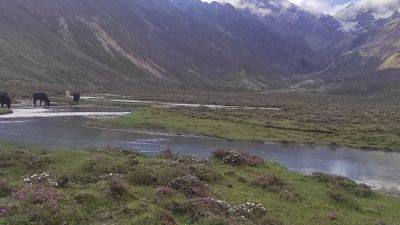Climate crisis stings Nepal’s honey gatherers, threatens tradition
In Pictures
Aita Prasad Gurung dangles off a cliff in Nepal, carefully manipulating a long pole with a blade at its end to cut away chunks of honeycomb after Himalayan bees fled fumes from a fire set to drive them from their homes.
The 40-year-old wear a white hat with a net covering his face to protect against stings as he hangs 50 metres (160ft) off the precipice on a handmade ladder braided from bamboo strands to reach the bee colonies.
“It is fraught with the danger of falling,” says Aita, whose community has traditionally harvested honey from hives perched dozens of metres off the ground. “One must extract honey and stay safe at the same time.”
Now the generations-old craft is increasingly under threat as some experts say rising temperatures brought by climate change disrupt the growth of bees, the availability of their food and even the pollination of plants.
“There were about 35 hives last year,” says another member of the community, Chitra Bahadur Gurung, 49, adding, “We barely have 15 now.”
For generations, the Gurung community in Taap, about 175km (110 miles) west of the capital, Kathmandu, and other villages in the nearby districts of Lamjung and Kaski has scoured the Himalayan cliffs for honey.
Earlier, the villagers joined in the ritual slaughter of a red rooster, separating its feet and feathers as an offering to the cliff god to seek forgiveness for taking the honey from the giant bees, known to scientists as Apis laboriosa.
The honeycomb extract, also known as “mad honey” for some intoxicating qualities that can cause hallucinations, sells for 2,000 Nepali rupees ($1.50) a litre (about a quarter of a gallon).
The proceeds, split among the group, are drying up as the number of hives declines, the villagers







